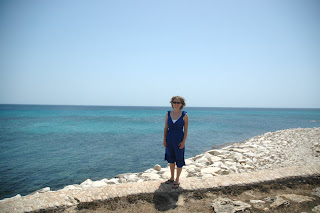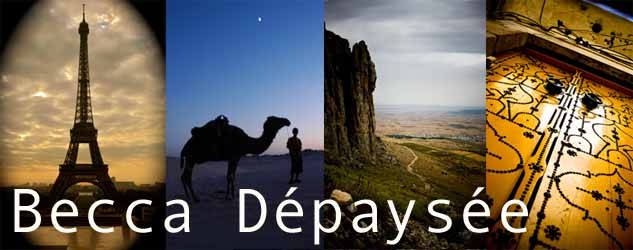 This last week has been tense and uneventful as far as material for blog entries goes. Monday was my Tunisian dialect oral proficiency test—I did pretty well, so I’m happy. I just finished my three-hour written Arabic final, which only leaves the 15-minute MSA oral interview tomorrow. I’m a little nervous about it because it’s with official Foreign Service testers (and I hate oral anything anyway) but I feel surprisingly proud of my Arabic regardless of how well I perform under pressure. Having the last few days to review everything we’ve done so far has really given me an appreciation for the range of my vocabulary and my ability to be inventive with the language. I have the basic tenses and grammar mostly down, and I’m able to talk in some detail about why I’m here and what I’m doing next year—pretty cool accomplishment in a language I couldn’t even read eight weeks ago.
This last week has been tense and uneventful as far as material for blog entries goes. Monday was my Tunisian dialect oral proficiency test—I did pretty well, so I’m happy. I just finished my three-hour written Arabic final, which only leaves the 15-minute MSA oral interview tomorrow. I’m a little nervous about it because it’s with official Foreign Service testers (and I hate oral anything anyway) but I feel surprisingly proud of my Arabic regardless of how well I perform under pressure. Having the last few days to review everything we’ve done so far has really given me an appreciation for the range of my vocabulary and my ability to be inventive with the language. I have the basic tenses and grammar mostly down, and I’m able to talk in some detail about why I’m here and what I’m doing next year—pretty cool accomplishment in a language I couldn’t even read eight weeks ago.Other things from the last week or so…
*I FINALLY hit up Tunisian bookstores. The books I got for my SMP last year had to be ordered from France at high cost, so tracking down a few hard-to-find Maghrebine novels has been on my to-do list since I got here. I picked up a few novels I’ve been wanting for a while, as well as a book of coming-of-age short stories by Tunisian writers, a book of the famous Tunisian poet Chebbi’s work (in Arabic!), and some bilingual French-Arabic children’s books that recount the adventures of “Petite Anne.” At the recommendation of my new friend the bookstore worker, I also got a book by Tahar Fazaa, who is apparently a very popular and hilarious local writer à la David Sedaris. Last but not least, I found a poster of Africa and the Middle East that featured the names of all of the countries in Arabic. Woohoo!
I was surprised to find out how expensive books were (not so bad when you translate the dinar into US$ or Euros, but relative to the cost of other items in Tunisia, pretty high) and I wonder how many typical Tunisians are actually able to afford books. I know that my host family has almost none, and none at all for their 5-year old daughter. There was a separate children’s section in both stores, but it seemed rather limited (and also very French-heavy…there were almost no children’s books in Arabic). I also found the Tunisian bookstores to be much smaller and less inviting than American bookstores. Without a couch to sit on while I browsed through books, I instead opted to crouch Indian-style on the floor, which seemed to surprise and amuse the bookstore employee I had been talking to. (Tunisians are really weird about the floor—sitting on it or putting anything on it earns you some weird looks, as does putting your feet up).
*I went to Hammamet (literally: the baths) with the group last weekend, which is pretty much a classier version of Ocean City, or, in my mind, a less-classy version of Nice. Definitely the most “touristical” (in the words of our adorable guide, Hatem) and less culture-rich of all the places we visited (complete with a theme park “Carthageland” which is basically a less-intimidating, non-bargaining version of a typical medina market…totally weird). It was good considering how burnt out we all were, though…I didn’t do much except lay around on the beach and enjoy my first wine in WEEKS. I’m glad I’m doing my graduate work in a wine-friendly country. I’m convinced this whole thing would be much less stressful if I were allowed to maintain my wine-and-whine working routine (which is much healthier than the tea and shisha routine here).
*After not doing laundry for more than two weeks, and not doing our whites for over a month, our host mother FINALLY did some yesterday. Granted, it was so shoved in the machine it probably hardly got clean and will have fun detergent spots all over it, AND I got scolded for my pink skirt bleeding on a white shirt (who washes bright pink with whites?) but at least it means that I might make it to Sunday without having to do any emergency sink washings, inch’allah
* We had our last pottery class this week. Overall, I kind of fail at pottery as an art form—especially on the wheel—but I liked the cool earthy feel and the metallic smell and the fact that it was pretty much the antithesis of studying Arabic (and I only thought about Ghost a teensy bit). I made some Tunisian-esque tiles, a bowl, and some failed pots that I probably won’t waste suitcase space on. Our teacher, a really cool Tunisian artist, gave us all a piece of his own work as a parting gift...I got a really cool crackle-glaze and gold bowl with a bird in the center that would probably go for a few hundred dinar if he chose to sell it.
 *I’ve been taking the bus home lately and really enjoying it. Once I climb in and pay my 450 to the man in the back (a dinar is broken into 1000 cents here), I put on my iPod and enjoy the small amount of “alone time” I’m allowed in this program. The ride itself is somewhere between the crowded sweatiness of the Nice buses and the reckless downhill speeds and sharp turns of British buses (think the African version of the knight bus, all you HP fans). The Tunisians have some inherent ability to remain still, looking on nonchalantly as I stagger around with each turn.
*I’ve been taking the bus home lately and really enjoying it. Once I climb in and pay my 450 to the man in the back (a dinar is broken into 1000 cents here), I put on my iPod and enjoy the small amount of “alone time” I’m allowed in this program. The ride itself is somewhere between the crowded sweatiness of the Nice buses and the reckless downhill speeds and sharp turns of British buses (think the African version of the knight bus, all you HP fans). The Tunisians have some inherent ability to remain still, looking on nonchalantly as I stagger around with each turn.*I have learned a lot about myself as a student and a person in this program. Conclusions: 1) I’m a very auditory learner, at least with languages, although I also do pretty well independently when it’s writing-related. Classroom reading and computer exercises do very little for me. 2) I have a strong need for alone time and the ability to dictate my own schedule to a small extent at least; not having either makes me cranky. 3) If I can be aware of being cranky, I can take conscious steps to be more positive. 4) And last: to make positive thinking successful, I need to surround myself with positive people. Fortunately, they have been in no short supply in this program.
Tomorrow night is our banquet, Saturday will be a Tunis day, and I fly out Sunday morning to Paris to apartment-hunt for two days before I meet Mom in Morocco! Yes, my life is awesome. I just need to get enough rest to appreciate that again.
































